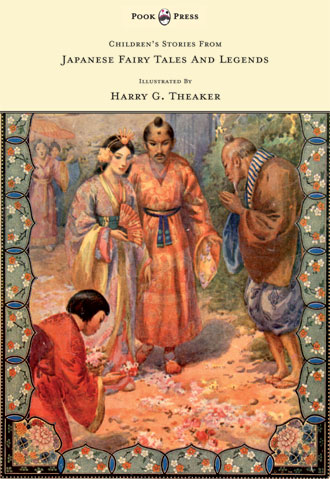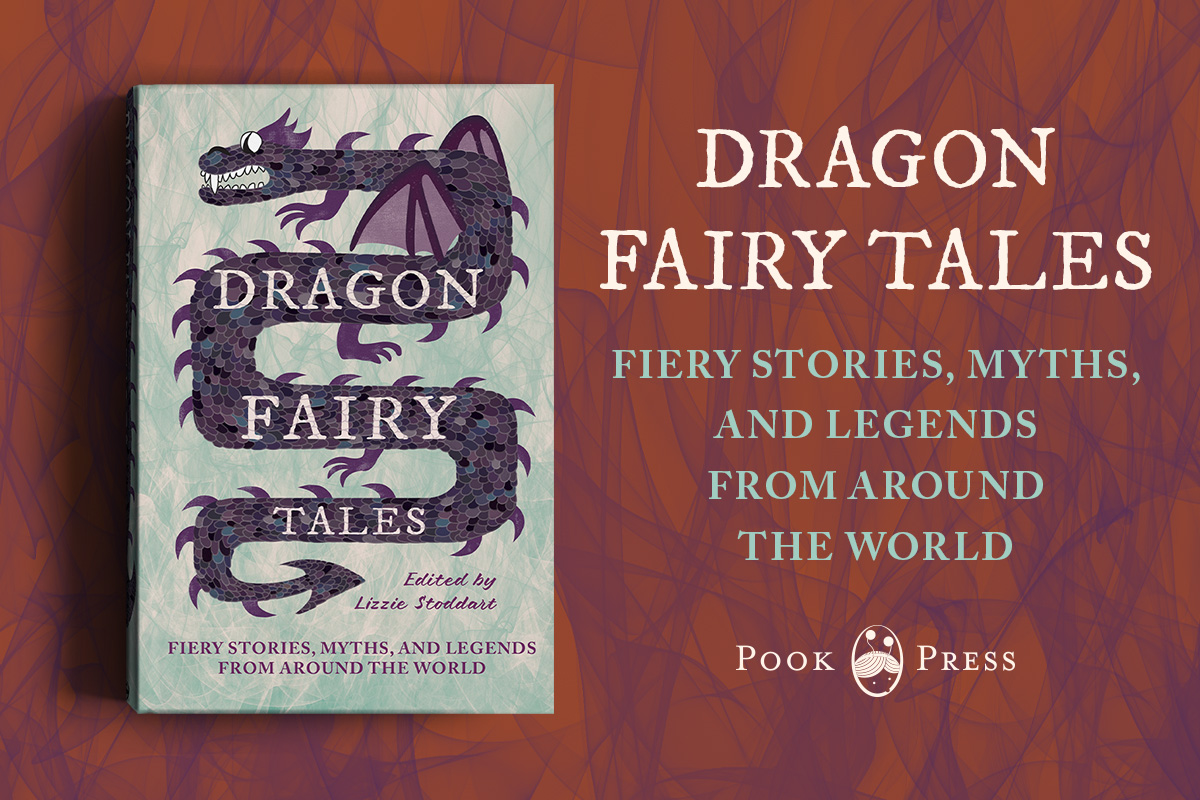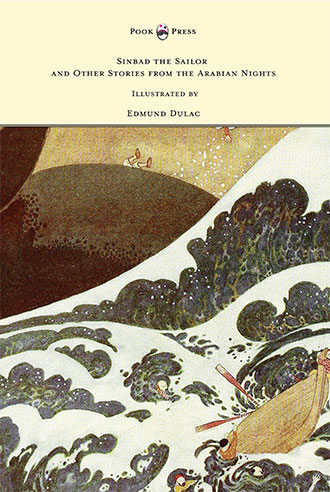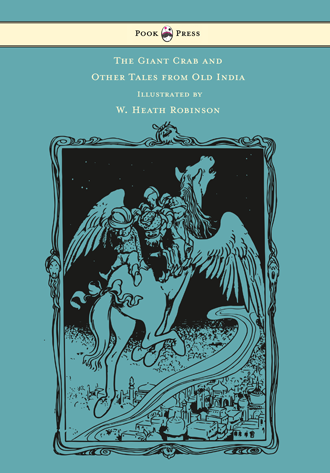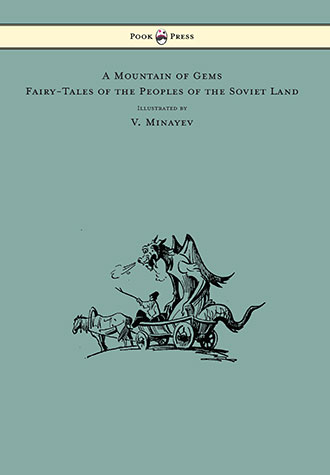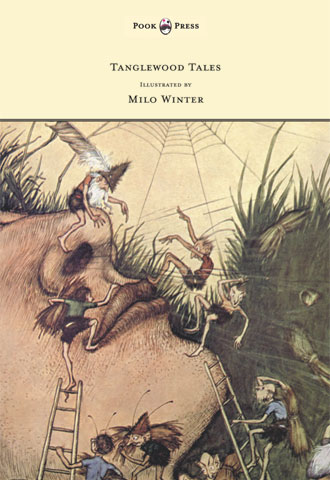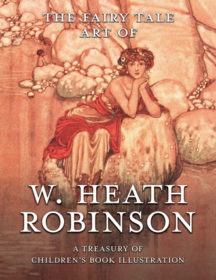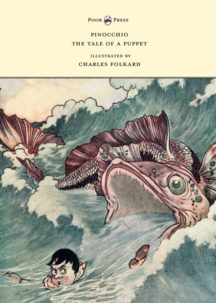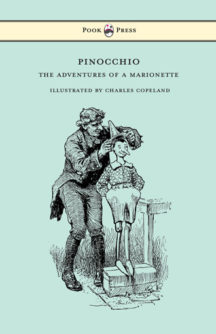A Daughter of the Moon – A Japanese Fairy Tale
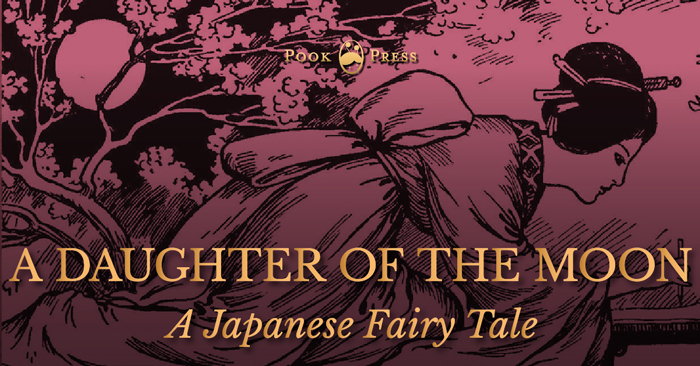
A tiny fairy in a bamboo stem, five impossible tasks, and a bottle of the elixir of life.
A Daughter of the Moon
In bygone days, ever so long ago, there lived in a little village at the foot of a mountain an old wood-cutter called Taketori. He was very poor and earned his living by cutting bamboos, and making them into baskets and other useful things. In fact, his name, Taketori, meant a bamboo-cutter.
One day when he was wandering about in the forest, looking for bamboo-stems fit to cut, he saw a soft light shining from the roots of one of the trees, and on drawing near to it he found that the light came from a tiny fairy who was caught among the stems of bamboo. Wondering greatly he picked up the fairy, who glowed like a firefly, and took it home in his sleeve to show to his old wife, and they were so delighted with the lovely little thing that they resolved to keep it.
To their great surprise, in a few months’ time the tiny fairy grew up into a tall and beautiful maiden. Nobody on earth had seen a fairer or a more noble-looking girl. As they had no children of their own, old Taketori and his wife were exceedingly glad that this good luck had come to them, and tried to rear the child in the best possible way. They dressed her in silken robes, built her a new house, and indeed made a great lady of her. And you must wonder how these two poor old people could afford to do all these things; but the fairy proved to be a bringer of good fortune to them, besides being herself the greatest joy to the wood-cutter and his wife. Strange to say, ever since the day he first saw her in the forest, whenever he went out to cut down a bamboo, the wood- cutter found golden treasures hidden between the joints of the stem, so that soon Taketori and his wife became very rich, and were able to build a magnificent palace, where they lived with their adopted daughter.
Now the time came for her to be named, for it would not do to always call her the Fairy Baby when she was grown up. So they gave a royal feast to celebrate the occasion, to which all the Princes and nobles of the country round were invited. And what do you think was the name chosen for the lovely maiden? She was called Nayo-Take-no-Kaguya-Hime, Princess Splendour of the Feathery Bamboo, a name which surely suited her wonderful beauty.
After the feast had been going on for three days, during which time the guests could not believe their eyes—so beautiful was this new-found Princess—Taketori and his wife took good care to keep her within the inner court of the palace, as they feared that the eager gaze of all sorts of people might rob her of her glory, and, besides, they believed it the most fitting way of showing honour to a Princess of such noble birth.
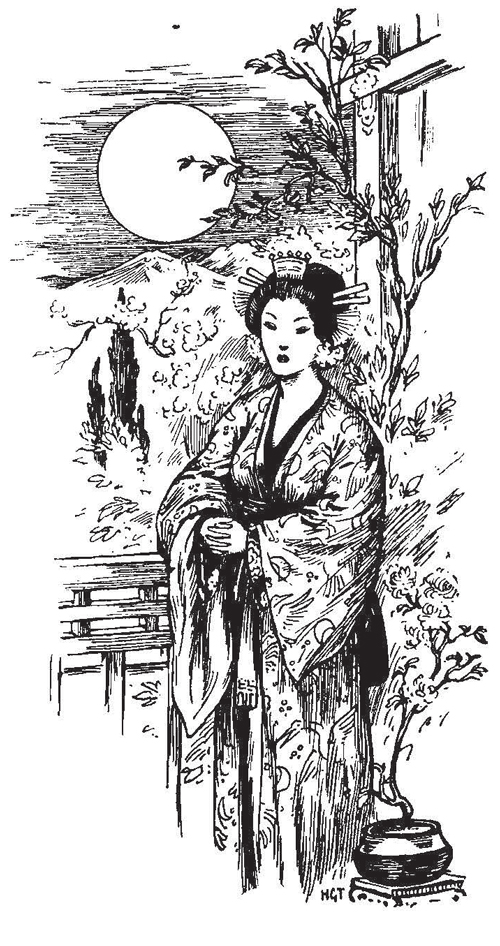
Before long the fame of the Princess’s beauty spread all over the whole world, till everybody was crazy to see her Many of the Princes of the realm left their palaces, and spent days and nights hovering around the high hedge of the garden enclosure, hoping that by some happy chance they might catch a passing glimpse of the lovely maiden.
Naturally there were many suitors who came to court her, and longed to marry her, and among those who were most devoted were two Princes of royal blood, besides three of the highest nobles of the land. The old bamboo – cutter much desired to have his adopted daughter married to one of these suitors of exalted rank, but to his great disappointment she refused all their offers; she said that men were fickle, and not to be trusted however eager they might be in their love-making.
Besides— she told her father—she was afraid that these nobles who were courting her might not realize that she was brought up as a poor wood – cutter’s daughter, and they might soon become tired of her; and so before she would consider the matter seriously, as her parents wished her to, she desired that her lovers should do some great deed to prove their true devotion to her.
To this condition the Princes and the nobles willingly agreed; but when they heard what the young Princess demanded of each of her suitors, they were very much troubled in mind, because the maiden hoping to get rid of them now and for ever asked them to perform such deeds as were almost impossible.
One of them the Princess sent to India to find the age-buried stone bowl of Buddha, who lived in that land thousands of years ago; and another she sent to seek a floating island called Horai, in the Eastern Ocean, and to bring her a branch of a jewel-tree which grew there; a third was to procure for her the rainbow jewel from off the neck of the dragon that lived in the depths of the ocean; a fourth was to go to China and bring back a fur robe made of fire-rats, which would not burn even if it were held in flames of fire; and the last one was to find the pearl-shell which the swallows keep hidden away in their nests. It was clear that these wonderful things were all out of the reach of her lovers, but they pretended willingly to obey her wishes, even at the risk of their lives, for each and all declared that life was not worth living without her.
THE STONE BOWI, OF BUDDHA
Now, the Prince who was to go to India to find the stone bowl of Buddha was a lazy fellow, and though he wished to marry the Princess, he thought he would never be able to cross those thousands of miles of sea and reach that country alive; and even if he arrived there, how could he ever succeed in finding Buddha’s bowl? So very cunningly he sent word to the Princess that he had set out for India that very day, but what he really did was to go and hide himself for three years, which was the time necessary to journey to India and come back again. At the end of the three years he went secretly to an ancient Buddhist temple near by and found there an old stone bowl covered with soot and dirt. Taking this home he wrapped it in embroidered silk, and in the bowl he dropped a love-letter in which he told the Princess how he had shed his heart’s blood in crossing seas and mountains to obtain the desired bowl, and how he longed to have her favourable answer to his suit.
The Princess was much surprised to see the bowl when it was sent to her, for she did not expect this lazy Prince would have taken the trouble to travel all the way to India for her sake. But on opening the silken wrapper she soon discovered the trick, for the stone bowl was not at all the one she expected. She knew that the sacred stone bowl of Buddha must sparkle with heavenly lustre, while this ugly dirty old bowl was mere rubbish. So she sent the present back to the Prince with a short note thanking him for all his trouble, but saying at the same time that she failed to find any sign of true devotion in this commonplace piece of stone which could be found in any temple near at hand.
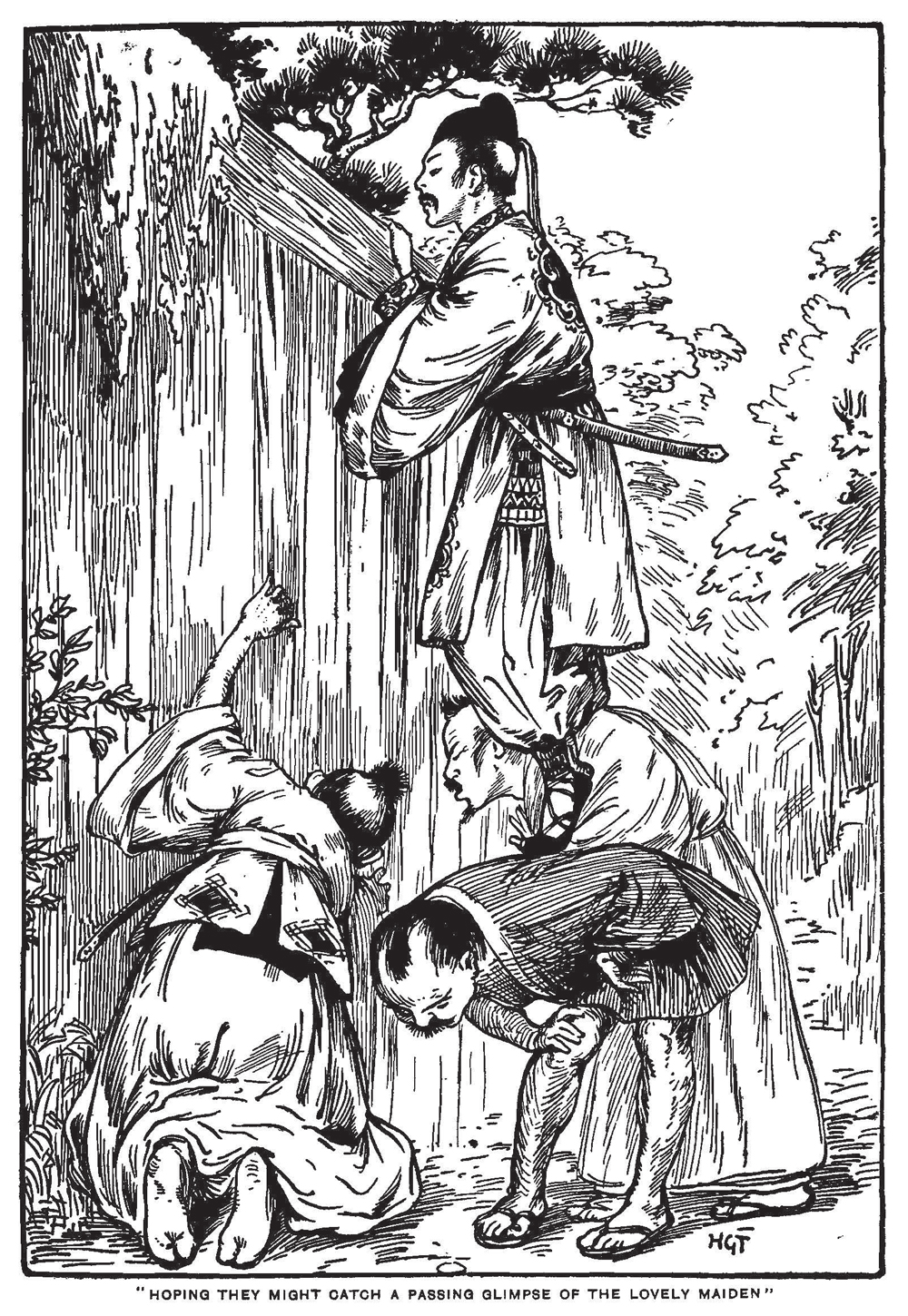
THE JEWEL-BRANCH OF HORAI
Now the Prince who was sent in quest of the floating mountain of Horai was very crafty and very rich, and he determined to gain the hand of the Princess at any cost, so he bade farewell to his friends at Court and started on the journey which he said would take him at least three years. Of course he sent word to the Princess that he was about to set out in search of the jewel-branch even at the risk of his life in order to win her favour.
That was the last the Princess and the world heard of him for the three years; but one fine day there came a rumour that the Prince had returned from his travels bringing a splendid branch of the wonderful Udonge flower which is believed to bloom but once in three thousand years. You can imagine how much the Princess was surprised when a messenger from the Prince brought her this wonderful jewel-branch in a richly ornamented box. She had never seen such a beautiful thing in her life. The stem of the branch was of pure gold, the delicate leaves of shining silver, while the glorious flowers were precious gems of many brilliant colours! As the Princess was admiring this wonderful jewel-branch the Prince himself was announced, and entered all travel-stained and weather-beaten, having, it was supposed, come direct from his long journey to claim the fulfilment of the maiden’s promise.
Then at the request of old Taketori, the Prince began to tell the story of his marvellous adventures during those three long years. He told them how he set out on his journey on an unknown sea, entirely trusting to fortune, having determined never to return alive unless he found the jewel-branch, how his ship was driven day after day, month after month, by a strong gale, during which time the rough seas seemed to swallow him up at any moment; how on some occasions the ocean became suddenly becalmed so that they were unable to sail anywhere; how the food was all gone and the Prince and the sailors were compelled to live on jelly-fish and seaweed; and how often horrible demons of the sea rose from the deep to devour them! Then he went on to describe, in great detail, how after five hundred days he finally reached the floating island of Horai, where he at last succeeded in obtaining the jewel-branch that the Princess had described to him.
“I can assure you, my dear Princess,” he ended, “the island itself is really a huge mass of jewels; the sand silver, the mountains gold, the trees all covered with precious stones; and still more wonderful, the inhabitants of the island know no death, but remain young for ever. In fact, I met there many a maiden of angelic beauty who was quite willing to marry me if only I had desired it. In such a fairy-land one could well wish to remain for ever, but the moment I had obtained the branch, my heart longed to return topresent it to you, my dear lady, so hastening to the ship, thanks to the fair winds, I arrived here within four hundred days, and without waiting to change my robes all wet with salt spray I came straight to you.”
His story was scarcely finished, however, when a great tumult arose outside the gate of the palace; it was caused by a half-dozen people who knocked on the portal and shouted for admission. Without waiting for it to be opened they rushed in at the side gate, and with angry voices demanded the Prince to pay them instantly for the labour of three years. The Princess and her parents did not know what all this meant, but after a few minutes everything was made clear. They perceived that the Prince changed colour and became green with shame and disgrace, for it now was shown that these people were the highly skilled jewellers whom the Prince had hired to make the jewel-branch, promising them rich rewards as well as official rank if he were satisfied with their work. It also appeared, to their bitter disappointment, that the Prince had given them neither wages nor rank, and so having heard that he was going to marry the Princess Splendour on the strength of his wedding gift, the jewellers made bold to come to the palace in order to be paid, or to take back the jewel-branch before it was too late.
It is needless to say that the Prince had not undertaken any journey, but had hidden himself away until his order was executed, and his mortification on the discovery of his crafty deception was so great that he covered his face with his hands and dared neither look up nor down, but crouched on the floor till the sun set, when he stole away into the darkness.
THE RAINBOW JEWEL OF THE DRAGON
The third Prince, who was to get the rainbow jewel from the dragon’s neck, was a great boaster as well as a great coward. To escape any danger that might possibly befall him, he sent several vassals away with strict commands that they should never show their faces to him again unless they brought the trophy to satisfy him. At first these vassals objected to his order, saying that such an adventure was quite useless, considering that in the first place they did not know where to find a dragon which was said to dwell in the depths of the sea or in the clouds rising out of the ocean; and in the second place, even if they met it, how would it be possible to capture such a creature, and to take the rainbow jewel from its neck? But as their lord was very angry at these remarks, and accused them of cowardice and lack of loyalty, they at last pretended to obey his orders and to undertake this dangerous task, even at the risk of their lives.
Much pleased at their consenting to go on the expedition, he gave them large amounts of money which were necessary for their journey. They took the money and apparently started on their ways, but the truth was that instead of going to the sea they hid themselves as the others had done in some distant places during three years, and spent their money in comfort and pleasure. In the meanwhile, quite confident that at least one of his vassals wouldbring him the dragon’s jewel, the Prince ordered a beautiful palace to be built wherein to live with the Princess when he was married to her.
But after waiting in vain a whole year, his patience was exhausted, and taking only a few faithful attendants he started to the sea-port where he expected his vassals to arrive, and inquired of the sailors there if his retainers had not yet returned with the captured treasure. Finding that the sailors had not even heard of the departure of his men, he burst into a fit of anger, uttered every kind of curse, and brandished his sword in defiance of the dragon, which he said he would surely kill himself. Coward though he was he forgot all about the danger he might meet with, and chartering one of the ships, he embarked on the voyage to an unknown sea.
Before many days there arose a great storm, the raging waves tossed his ship to the sky, the lightning flashed, and the thunder-bolts fell all around them. The Prince was frightened out of his wits, and the sailors declared they had never met such a fearful storm in their lives, and attributed the cause to the anger of the King of the Sea, the dragon itself. So the sailors persuaded the Prince that the only way to be saved under the circumstances would be to pray for pardon from the dragon. Thereupon the poor Prince fell on his knees, and between his tears kept saying over and over again, “O Mighty Dragon! I said I would kill thee, but now I promise never, never will I touch even the tip of thy tail, if thou wilt only let me off this time.”
Soon the storm ceased, but the cowardly Prince was so much frightened that he would not believe it, and when after many days the ship reached the land he was picked out of the vessel almost lifeless. Indeed, he was in such a ridiculous condition that people could not look at him without laughing, for his eyes were so swollen that they looked as if plums were fastened beneath them, while he trembled like a leaf from the effect of sea-sickness and fright. On his return home, a rumour spread about that he had come back with the dragon-jewel, but those who knew better laughed till they nearly split their sides, saying that the only jewels he had brought back were the plum-jewels under his eyes.

THE FIRE-ROBE
The fourth Prince, who was told by the Princess to bring her the fire-robe from China, was also unsuccessful; he had sent out a faithful retainer, who after long and difficult search in that far-off land finally bought the precious robe made of the fire-rats. The delighted Prince took it to the palace of the Princess, of course, quite confident that it would please her—and pleased she really was to see the silvery fur shimmering in the sunlight—but since the other suitors had deceived her, she wished to find out if the robe were genuine, and with the Prince’s consent put it in the fire. To the bitter disappointment of the Prince the robe turned into ashes, only leaving smoke, which soon vanished together with his hopes.
But in this case the fault was hardly on the side of the Prince, since he himself was deceived in purchasing the false robe for a large sum of money. Knowing this, the Princess felt very sorry for him and, after he went home with a sad heart, she wrote him a letter, saying that although she could not comply with his wishes and marry him, seeing he had failed to fulfil his promise, yet she did not doubt his sincerity and wished him happiness in the future. The poor Prince although greatly disappointed cherished the consolation that the Princess at least pitied him, even if she did not love him.
THE SWAIXOW’S PEARL-SHELL
Lastly, the fifth Prince, who, as you remember, was told to present her with the pearl-shell taken from the nest of a swallow, was most unfortunate of all. After receiving the commands of the Princess he summoned the chief of his retainers and ordered him to search the swallows’ nests in the roof of his palace in the hope of finding the shell in one of these. Soon a great scaffolding was built, long ladders were brought, and hundreds of servants climbed to the roof and made a thorough search in every swallow’s nest. But no one was successful, as the swallows were frightened by the confusion and all had flown away before the servants reached the empty nests.
The Prince was quite at his wits’ ends; when an old retainer came up and told him that it was absurd to search in such a way, for the swallow being a timorous bird could not be induced to lay eggs so long as so many men were about. The only proper way would be to take all the scaffolding down and have a strong basket made so that at the right moment some one could be raised up to the nests quite silently. The Prince was much pleased with this wise advice, and gave the old man a handsome reward, and ordered all things to be done as he had suggested. The next morning, when a swallow was seen laying eggs, a man was quickly hoisted up in the basket, but to the great disappointment of all he found nothing. Then, having come to the end of his patience, the Prince got into the basket himself and ordered his men to haul it up.
He reached the nest just in time, and saw the swallow laying an egg. Slipping his hand quietly into the nest, he touched something round and cold, which he grasped tightly, and called out, “Lower away, old man, I have found it.” But the rope, which by this time was much worn, suddenly broke, and he fell to the ground half dead.
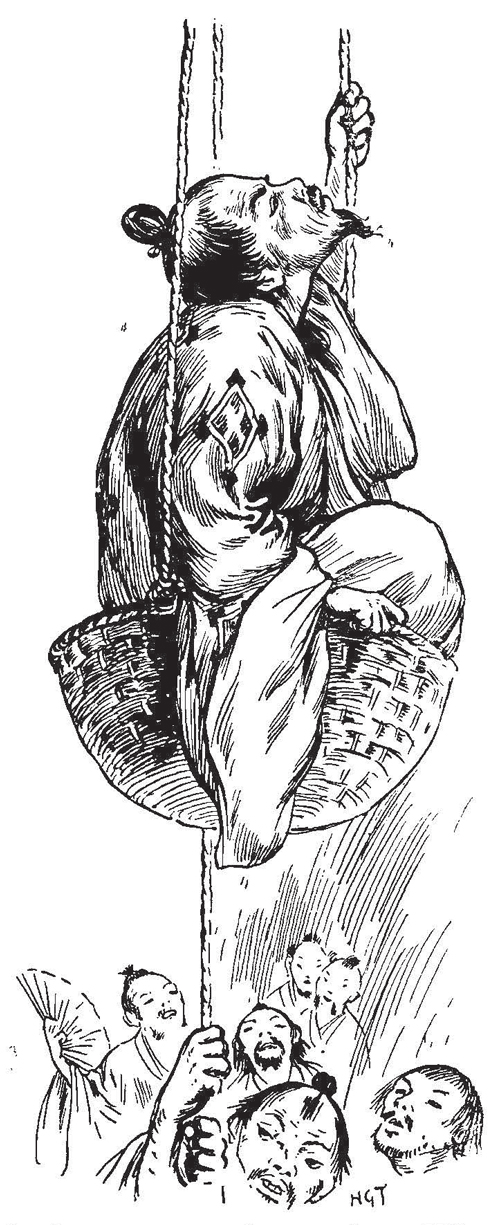
His servants sprang forward, and lifting him up did all they could to restore him, but his backbone was badly broken, and after a few days he died, still grasping in his hand a little piece of hard mud which he thought was the pearl-shell!
WOOING OF THE MIKADO
Thus ends the story of the five wooers of the Princess. But they were not the only persons who sought the hand of the beautiful maiden. In the course of time, the fame of the Princess Splendour’s beauty and the sad fate of all her lovers reached the Imperial Court, and the Mikado himself became possessed with a desire to see her. So he sent a Court lady to the house of the old wood-cutter to find out what the Princess was like. When the noble lady reached the Princess’s home in grand state and told old Taketori and his wife that she had come to see the Princess by His Majesty’s express command, they were overjoyed at the thought that their foster-child would perhaps one day be Queen of the Empire.
THE PRINCE TELLS HIS STORY
But again, to their intense disappointment, the Princess absolutely refused to see the noble lady, saying that even the Mikado had no power to compel the heart of a maiden. On receiving the noble lady’s report of her failure, the Mikado smiled, and said, “Oh, the little flirt! she wants to break my heart, too”; and tried to think no more about it. But the more he tried the less he could forget, and so he finally sent for Taketori and asked him for his daughter in marriage. The old wood-cutter could scarcely believe his good fortune when His Majesty expressed his earnest desire to marry the Princess, and, to add to his joy, the Mikado promised a high rank to be conferred upon Taketori if the marriage could be arranged.
Highly delighted, the wood-cutter went home and begged the Princess to comply with the wishes of the Mikado; but again she absolutely refused, declaring that she would rather fade away than be forced to marry.
“What?” cried the old man, “you say you will fade away! Do you mean, my dear daughter, that you will die? No, no, that won’t do. I will go and tell the Mikado that you cannot comply with his wishes.” But the Emperor, now firmly determined to marry her, told Taketori that he would go out with a hunting party near the Princess’s house, at the foot of the mountain, and would come in and take her by surprise before she had time to refuse to see him.
This plan being well arranged, the Mikado set out hunting one day, and reaching the house of the Princess, suddenly entered without being announced. Then he indeed beheld the most enchanting figure he had ever seen. Surely, compared with the super-natural beauty of the Princess, all the fair ladies of the Imperial Court were nothing but the faint starlight in the presence of the moon.
In a fit of ecstasy, the Mikado caught the Princess by her flowing sleeve, and in spite of her struggles to flee into the inner room he tried to carry her off by throwing his arm around her waist, when — wonderful to relate—she suddenly faded away from his sight!
This convinced him that she was no human being, but only a beautiful fairy, and he begged her to come back that he might see her once more before returning to the royal palace. Whereupon, she again appeared in her human form, filling the whole house with a soft radiance of heavenly light. Taking a long farewell he went away, bitterly disappointed that this beautiful being was lost to him, yet so glad and grateful that she had not vanished for ever from the earth, that he knighted old Taketori on the spot and gave him command of a hundred of his own followers.
THE SHINING HOST FROM THE MOON
After this no one attempted to disturb the peace of the Princess, but as time passed on, at the return of each full moon, she seemed sad and depressed and would steal away by herself to the balcony and gaze, weeping, at the moon. Taketori and his whole household were very much concerned at the change in the maiden, and her parents insisted upon knowing what was the matter with her. Then she finally sobbed out:
“From the beginning of this year, I have wished to tell you, but was afraid of distressing you too much, but now I must speak. I am really a child of the moon, and in the bright capital of the celestial world there are my real father and mother waiting for me. By a strange circumstance I came to this earth for a while, but now the time approaches when I must return, and at the full moon of this month they will come to take me back. This is why I am so sad these days, for it is not that I wish to leave you who are so dear to me, but being born in the other world fate compels me to return to my true home.”
On learning this, old Taketori and his wife and all their attendants burst into floods of tears, and for a time they all wept together.

The Mikado hearing this strange story sent a messenger to Taketori to ask if the report were true. Taketori repeated to him the sad disclosure and begged that the Mikado would, at the time of full moon, send a strong guard to keep the Princess from being carried off. This petition was willingly granted; and the Mikado gave orders that two thousand soldiers with the commanders of six divisions of the Imperial Guard should defend the house. One thousand men were ranged upon the ramparts and one thousand on the roof of the house, for the invaders were to come from the sky. All these preparations, however, were of no use; as the Princess had warned them beforehand, no human being could fight the inhabitants of the moon.
On the night of the full moon, just at midnight, suddenly the palace and gardens around grew bright as day, glowing as if ten full moons were shining; while from the sky a great host descended, clad in shining armour, and they ranged themselves in the air several feet from the ground. The guards of the palace, brave men though they were, were all panic-stricken and, as if in a nightmare, their weapons fell from their hands, and their strength collapsed. Then the great gate and inner doors opened wide of themselves, so that the kingly leader of the host, in robes as brilliant as the moonlight itself, entered the room where the Princess was securely guarded, and ordered his moon-men to make ready the flying chariot which they had brought with them, and calling to the weeping Princess, he said, “Come, come, my child, why do you cry to return to your heavenly home? ”
The Princess wished to bid her earthly parents farewell before she was taken in the chariot, but old Taketori and the mother were so completely dazed and dumbfounded that she could not get them even to bid her good-bye. So she wrote them a letter and left it behind her, together with a garment as a keepsake. In the letter she said:
“When the moon is full, gaze upon it lovingly as you used to upon my face. I shall be watching you, and when the soft moon-beams fall upon you, you will feel as if they were my hands smoothing the wrinkles from your brows.”
She also left them a portion of the liquid called the Elixir of life, which the moon-men offered her to drink to purify her body from all earthly taint before she started on her heavenly journey. The last duty she had to perform on earth was to write a letter to the Mikado, in which she said:
“In spite of your Majesty’s great guard to prevent my leaving this earth, which I deeply appreciate, I may not stay, for such is the decree of fate. If I were an earthly maiden, it would be my greatest honour and pleasure to grant your desire, but this being impossible, I grieve both for my own fate and for your Majesty’s disappointment. My last thought on leaving earth was of you! ”
This she sent to the Mikado with the vial of the Elixir. Having thus bade farewell to earth the Princess Splendour wrapped herself in the shining mantle, and mounting the chariot, accompanied by the host from the heavens, rising towards the skies she vanished into the bright moonlight.
* * *
After the Princess had gone, her foster-parents overcome with grief and despair would not even listen to the Princess’s letter and refused to taste the deathless medicine, but, having lost all interest in life, they took to their beds never to rise again. When the Mikado received the vial and read the letter, he was also overwhelmed with grief and refused to drink the Elixir, but ordered an officer to climb the highest mountain in the land, the one that was nearest heaven, and kindling a fire on the topmost peak, burn both the vial and a poem which he had written.
Even the memory of our one meeting floats in tears;
Why then should I wish the death-less draught?
The officer appointed to carry out the royal behest ascended a high mountain in the country of Suruga, kindled a fire on the summit, and there burned the poem and the deathless medicine.
Ever since that time this mountain has been called Fujino-Yama, “The Deathless Mountain,” and every one who lives in Japan or who visits the country may still see the smoke of the fire rising towards the sky.
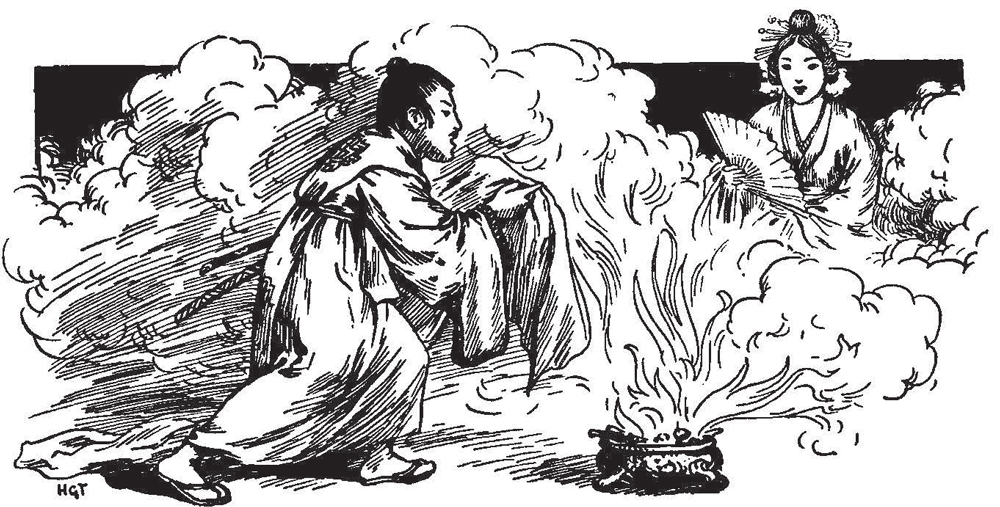
* * *
This story was taken from the book:
Children’s Stories From Japanese Fairy Tales & Legends – Illustrated by Harry G. Theaker
This collection of Children’s Stories from Japanese Fairy Tales and Legends was originally penned by N. Kato, and edited by Captain Edric Vredenburg, a noted British collector of folklore. He was a military man as well as an editor at Raphael Tuck and Sons; notable publishers of short stories and fairy tales. They produced many exceptional volumes of classic tales, retold for young audiences.
More Pook Press books you might like:
Soar the skies with fire-breathing beasts, explore the mythological lands of Ancient Greece, and brandish your sword with Saint George in this illustrated collection of dragon tales from around the world.

